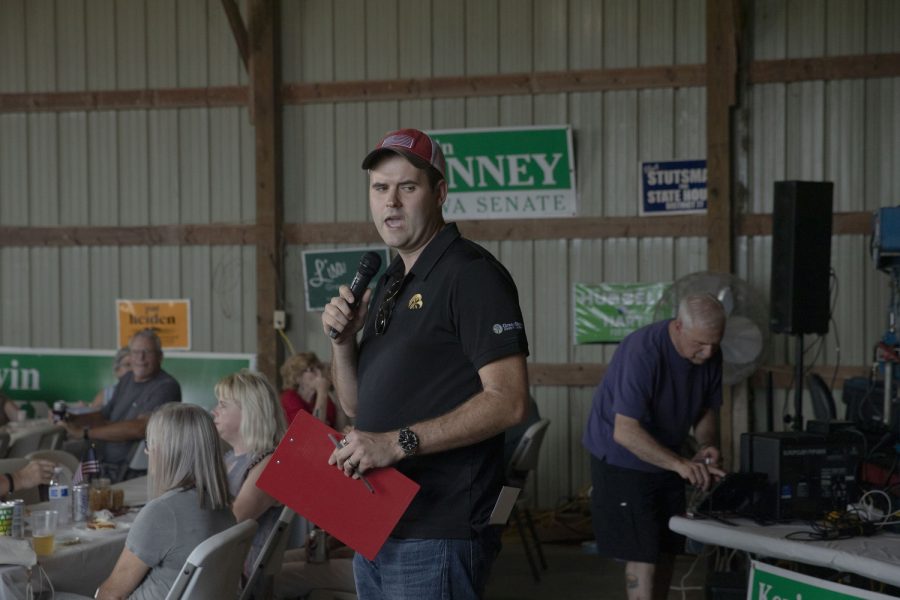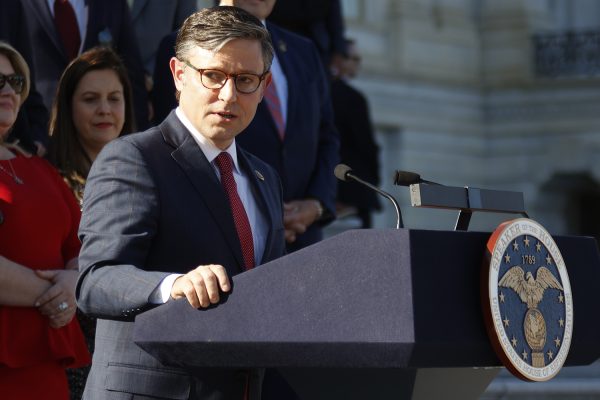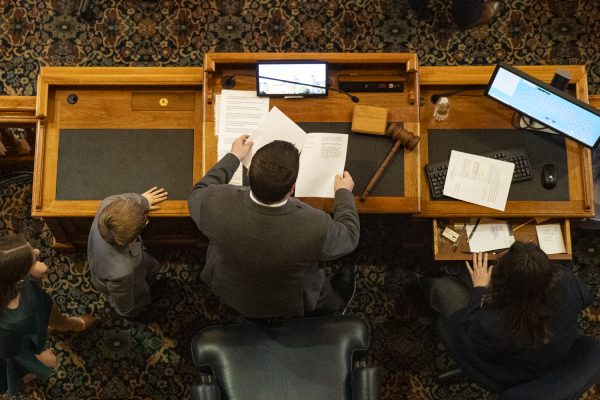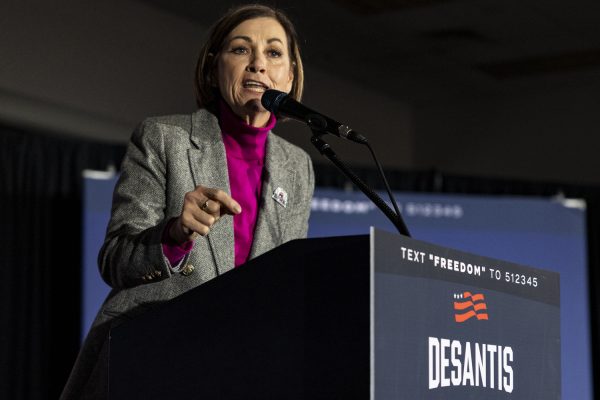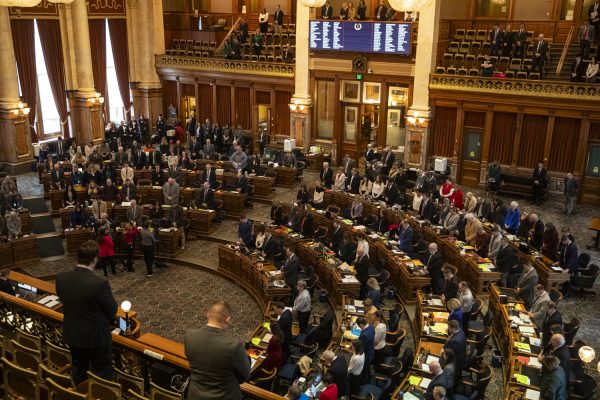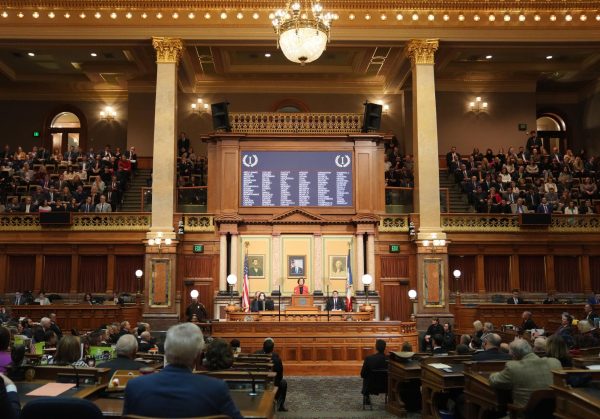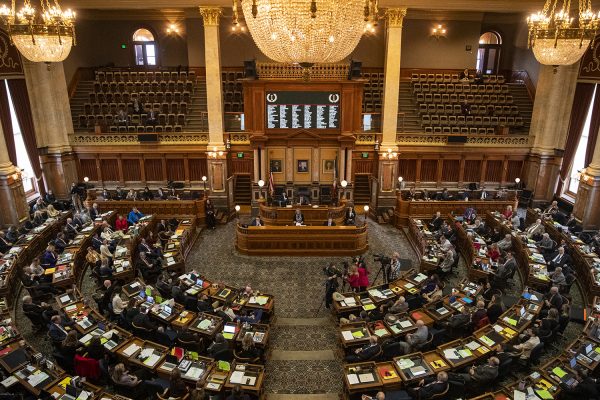Iowa Democrats say Republicans fighting “culture wars” instead of focusing on improving the state
Iowa’s population rose 4.7 percent since 2010, while rural counties continue to lose population.
Iowa State Senator Zach Wahls speaks Campaign volunteer Dominic Patathie guides parking during the Kinney Summer BBQ Bash at the Kinney Family Farm in Oxford, Iowa on Saturday, Aug. 27, 2022. Democratic candidate Kevin Kinney, D-Iowa, is running for Iowa Senate, District 39.
September 18, 2022
Iowa Democrats say conservatives are too busy fighting “culture wars” in the statehouse to work on improving Iowa’s rural areas to attract younger people to the state’s 38 most rural counties.
Iowa’s population rose 4.7 percent since the 2010 Census, according to the U.S. Census Bureau. Iowa’s 38 rural counties, however, saw a net population loss since the 2010 census. While Iowa’s five most populous, liberal counties’ saw a net population increase.
According to the U.S. Census Bureau, eight in 10 college students in the U.S. move back to or within 10 miles of where they grew up. Although a Washington Post investigation into brain drain found that more than 25 percent of college students who study in Iowa leave Iowa after graduation or move to Illinois.
Ryan Melton, a Democrat running for Iowa’s 4th congressional seat currently held by Rep. Randy Feenstra, R-Iowa, said Republican policies are driving young people out of the state, in a tweet on Saturday.
“Too many of our young people are leaving the state. This will get worse if we have officials in office who don’t respect them and they ask for affordable college, robust career opportunities, and reproductive rights,” Melton wrote in the tweet.
Iowa Rep. Bobby Kaufmann, R-Wilton, said in an interview with The Daily Iowan that this has been a bipartisan issue, not partisan politics.
“In totality where we are at, it’s a pretty bipartisan issue,” Kaufmann said. “So, that’s kind of one of the fun areas to work when you can have everybody’s input, Democrats and Republicans.”
With bipartisan support for retaining rural residents, Iowa legislation on the issue moved forward in the statehouse. Last year, the Iowa Legislature passed bills on broadband, childcare, rural economic development, and recreation development in the state.
But many Democratic legislators are looking to do more — blaming Republican policies for driving away young people from the state.
A July survey by the U.S. Census Bureau said economic factors were the largest factor in consideration when young people move.
Map by Ryan Hansen/The Daily Iowan
Iowa Senate Minority Leader Zach Wahls, D-Coralville, said Republicans have no plans to save small towns.
“They have completely abandoned small towns in rural Iowa, and instead are focusing all of their attention on culture war issues that are driving young people out of our state,” Wahls said. “There are growing gaps between the haves and the have nots, both in our small towns and our big cities, and Republicans made that issue worse when they passed a tax cut that is going to overwhelmingly benefit the ultra-rich and big corporations earlier this year.”
Over the last decade, the bottom 20 percent of Iowa households' wages decreased by 6.1 percent, according to the Economic Policy Institute. While the middle 20 percent grew by 4.3 percent and the richest 20 percent grew by 8.5 percent, according to the study.
The bottom 20 percent of an Iowa household’s average yearly salary was $24,800, while the richest 20 percent of household’s average yearly salary was $215,900.
Iowa’s minimum wage is the same as the federal minimum wage, which is currently $7.25 per hour if a person works a 40-hour work week. A person would make $15,080 a year before taxes if making minimum wage.
The average yearly salary in Iowa is $51,873 a year; the U.S. average is $51,916.27. While the median wage in the U.S. is $34,248.45 , Iowa’s is $39,083.20 — slightly above the national median.
Looking at these data points, Iowa is on track with the national average in yearly salaries. However, the state still suffers from income inequality.
Kaufmann said in his district income inequality isn’t a major issue, that there are companies that offer high wages that support his district.
“We have a strong job market. We've got, I mean, in my district, I can name companies off the top of my head that have strong wages, good benefits, that are in small towns,” Kaufmann said.
According to the Bureau of Labor Statistics in July 2022 Iowa had an unemployment rate of 2.5 percent. According to the Iowa Workforce Development, there are 84,059 on their online job posting board as of Sept. 14.
Wahls also said young people are concerned about climate, reproductive rights, the cost of college, and wages.
“Young people are rightly concerned about the future existence of our planet, which I think is a totally rational concern, not an extreme one at all. Young people are concerned about maintaining bodily autonomy, which is a totally normal and rational concern that's shared by a wide variety of age groups,” Wahls said.
According to a Pew Research Center poll, 74 percent of adults age 18 to 29 think abortion should be legal in all or most cases, while only 25 percent think be illegal in all or most cases.
According to another Pew Research Center poll, 67 percent of Gen Z and 71 percent of Millennials think climate solutions should be the top priority.
Wahls said young people are looking for public education to be funded in the state. Republicans have voted to cut funding from Regent universities in recent budgets.
“Republicans have systematically underfunded our region's universities and institutions, which has directly resulted in the increases of tuition that are making college increasingly unaffordable for middle class families,” Wahls said.
Republicans have capped the yearly annual increases in the state’s public education budget at 2.5 percent to account for inflation.
Democrats and teachers have said 2.5 percent isn’t enough. Deidre DeJear, the Democratic candidate for governor in Iowa, recently put forth her education policy plan that includes a 4 percent annual increase to the state’s public education budget and a $300 million influx of cash from the state’s budget surplus to Iowa’s schools to use at their discretion.
RELATED: Deidre DeJear puts public education as top priority at campaign event
Kaufmann said the Iowa legislature has moved forward on key issues that affect young people like childcare and Broadband internet.
“If you are young and want to have a family, look to childcare. We've been making some significant policy changes and investment in childcare, I think,” Kaufmann said. “If you look at broadband, there's some pretty big [coverage] desert areas in Iowa. The governor asked for and we gave 100 million dollars two years ago and then again last year to complete that.”
In 2021, the Republican controlled Iowa legislature passed a budget resolution funding $100 million dollars into the state’s broadband program Empower Rural Iowa. Gov. Kim Reynolds also created a task force to address the childcare shortage in Iowa and distributed $13 million in Future Ready Iowa Child Care Grants.
RELATED: Gov. Reynolds creates task force focussed on expanding childcare availability
Wahls said this was only part of what is important to young people, with social issues and political culture being important as well. Wahls also accused Republicans of “weaponizing cynicism,” to siphon the hope out of the left.
“Republicans and kind of the right wing authoritarian forces in this country want young people to feel disaffected, to feel like there's no difference between the parties. That's their strategy, right, is to muddle the differences,” Wahls said.
Wahls also said that policies involving education, recreation, and social issues are on the ballot this November.
“To fight for our interests, the most important thing that we can do is to participate in the electoral process, make sure that our friends and classmates are registered to vote, and have a plan to vote and show off this November,” Wahls said. “And the Republicans are hoping that we don't do that. That's their whole political strategy.”



